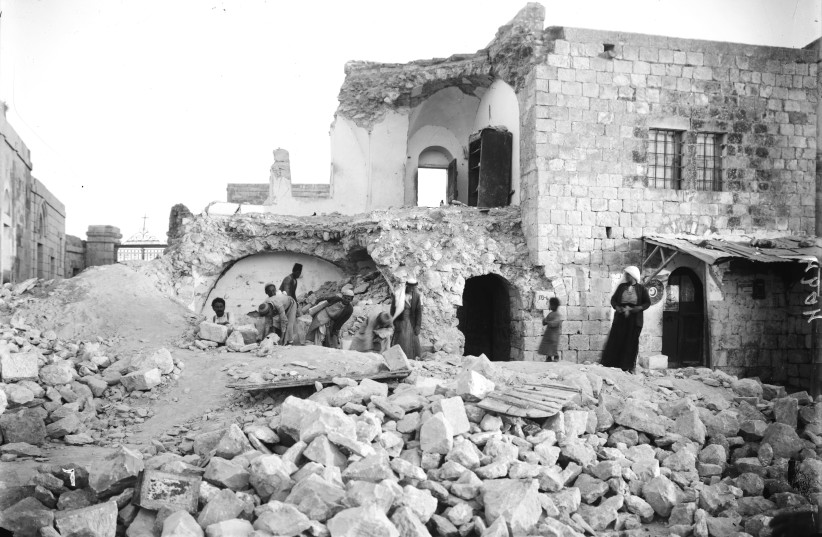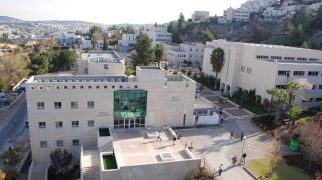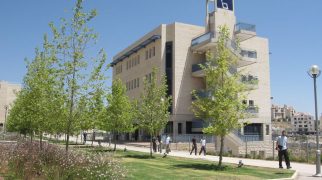March 8, 2021
The research was sparked by a recent revelation that a bed in the Dead Sea could cause an earthquake large enough to result in thousands of deaths within the coming years.

Damages from 1927 earthquake: A destroyed house on the Mount of Olives
Some 94% of Israel’s haredi (ultra-Orthodox) population would be unprepared if a catastrophic earthquake or natural disaster were to hit the state, researchers from the Jerusalem College of Technology (JCT) and the Hebrew University of Jerusalem (HU) found in a recent study.
The research, sparked by a recent revelation that a bed in the Dead Sea could cause a deadly earthquake that would culminate in the death of thousands, highlighted the vulnerability of haredi society in times of emergency, as made clear by the ongoing coronavirus pandemic.
“There is a pressing national need in Israel for continuous and consistent work with the haredi community before the occurrence of a natural disaster, in order to reduce these gaps in perception surrounding emergencies,” said Dr. Zvika Orr, a senior lecturer in the Faculty of Life and Health Sciences at JCT, and a lead researcher in the earthquake study.
The study aimed to analyze the effect of religious beliefs and minority status on disaster preparedness and recommend “ways for improving risk mitigation in religious minority communities.”
When asked: “Overall, have you prepared for an upcoming earthquake in Israel?” only 6% of the respondents answered yes.
Some 68% were unaware of the need to disconnect electrical and gas switches following an earthquake. Amid the survey, just under two-thirds (59%) of respondents admitted they do not believe they possess the knowledge to deal with an earthquake if it occurred.
Out of the 15% of the respondents who are parents of small children, and have also discussed earthquake safety with their family, only 3% went over best practices with their nuclear unit.
According to the research, the cavalier approach to earthquakes within these communities most likely stems from the majority of haredim being in disbelief that an earthquake of this magnitude could even occur in the near future.
Some 55% believe the odds of a disastrous earthquake taking place in the next five years is either non-existent or very low. More so, when asked if they believe the earthquake would hit close to home, such as their cities or communities, 64% don’t believe it to be likely – which is higher than the general Israeli society.
The researchers believe government policies and the self-imposed isolation within their communities being the reason behind the haredi population’s unpreparedness to face natural disasters. The universities said in a statement that “factors that have an adverse effect on the haredi public’s level of preparedness” include “technological disparities, low exposure to media outlets where the instructions are published, insularity of educational institutions, suspicion toward state authorities and low socioeconomic status.”
“It is incumbent upon policymakers in Israel or in any country to take these findings into consideration when attempting to upgrade the emergency preparedness of religious groups,” the universities added.
Twenty-five percent of respondents stated that after learning about the high probability of an imminent earthquake occurring in their area, they would help convince their communities to better prepare for the event. Some 68% said that instruction from a religious leader or one who rules under Jewish law could help boost these efforts.
Researchers believe that the state should set “clear, binding, and measurable preparedness standards and goals but allowing the local communities the autonomy and flexibility to decide how to reach these goals with state funds and monitoring.”
This would mean collaborating with “civil organizations that are perceived as legitimate by the Haredi society can lead and coordinate the preparation initiatives in this society; lectures, activities, drills, and seminars in Haredi educational institutions and during family activities; publishing the guidelines in Haredi newspapers, street ads, neighborhood leaflets, news websites, and radio channels; and adapting emergency technologies to make them acceptable for the community,” they added.
The researchers published their findings in the Natural Hazards and Earth System Sciences journal,
“Although we have documented a situation that leaves much room for improvement, goodwill on the part of the Israeli authorities can be met with goodwill on the part of considerable sections of the Haredi sector when it comes to emergency preparedness,”
said Prof. Amotz Agnon of Hebrew University’s Institute of Earth Sciences.
A destructive earthquake measuring 6.5 on the Richter scale is expected to hit Israel and its surrounding neighbors in the coming years, causing hundreds of deaths, a new study led by researchers from Tel Aviv University has found.
For the study, carried out under the auspices of the International Continental Scientific Drilling Program (ICDP) and published in the Science Advances journal, a rig was placed in 2010 in the center of the Dead Sea, which began drilling to a depth of hundreds of meters, enabling an analysis of some 220,000 years of Dead-Sea geology by studying the seabed.
The researchers revealed a cyclical pattern, since such devastating earthquakes seem to be hitting the region every 130 to 150 years – but there have been cases in history where the period of time between one earthquake and another was only a few decades long.
See full article: https://www.jpost.com/israel-news/some-94-percent-of-haredim-would-be-unprepared-for-an-earthquake-disaster-661317




